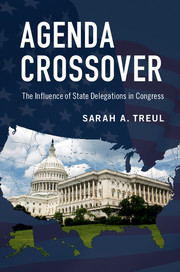Book contents
- Frontmatter
- Dedication
- Contents
- List of Figures
- List of Tables
- Acknowledgments
- 1 State Delegations in Congress
- 2 A History of State Delegations
- 3 State Delegations and Legislative Behavior in the House
- 4 State Delegations and Legislative Behavior in the Senate
- 5 Agenda Crossover in the U.S. Congress
- 6 Rethinking State Delegations in Congress
- Appendix A Interviews
- Appendix B Wisconsin's Unwritten Rule
- Bibliography
- Index
2 - A History of State Delegations
Published online by Cambridge University Press: 13 April 2017
- Frontmatter
- Dedication
- Contents
- List of Figures
- List of Tables
- Acknowledgments
- 1 State Delegations in Congress
- 2 A History of State Delegations
- 3 State Delegations and Legislative Behavior in the House
- 4 State Delegations and Legislative Behavior in the Senate
- 5 Agenda Crossover in the U.S. Congress
- 6 Rethinking State Delegations in Congress
- Appendix A Interviews
- Appendix B Wisconsin's Unwritten Rule
- Bibliography
- Index
Summary
States can be treated for analytical purposes as relatively independent political systems with political cultures at least somewhat distinct to themselves. (Patterson 1968, 195)
The cultures of states in the 1960s and earlier suggested to many political scientists, like Patterson, that states had unique interests worthy of representation. In fact, legislative behavior often reflected geographic preferences during this time period. State delegations worked together to set strategy and determine what was best for the state's constituents. Part of the reason for this was, as Patterson notes, that many states had specific cultures and interests needing representation in Congress. These interests unified the delegation on legislation and strategy.
However, in today's polarized Congress and more mobile society, ideology or party, rather than geography, is often thought to be a better predictor of legislative behavior. Despite the clear role of ideology and party in Congress today, the question remains: Do states today still maintain independent political cultures and interests requiring representation in Congress? Although this book demonstrates that, yes, state delegations continue to be interesting organizational units in Congress and, under certain conditions, they can even overcome partisanship, there is less evidence for states maintaining strong, independent political cultures. Before discussing state delegations today in greater detail, this chapter first sets out to briefly review the history of state delegations in Congress.
The notion that states have distinct political cultures can be traced back to before the writing of the Constitution. Under the Articles of Confederation, the original thirteen colonies were thought to be distinct enough to require equal representation, with each state receiving one vote. In writing the Constitution, the Founding Fathers continued to emphasize states as distinct in their institutional design of the Senate, the Electoral College, and the mechanism by which the president would be chosen should there be a tie in the Electoral College. Despite this clear appreciation for states as representational units, state delegations are frequently overlooked in contemporary literature on Congress. Thus, constructing a comprehensive history of state delegations is essential to developing a theory of how state delegations operate in and influence congressional behavior today.
This chapter first examines the history of state delegations in Congress by discussing the relevant literature dating back to the nation's founding.
- Type
- Chapter
- Information
- Agenda CrossoverThe Influence of State Delegations in Congress, pp. 27 - 50Publisher: Cambridge University PressPrint publication year: 2017



